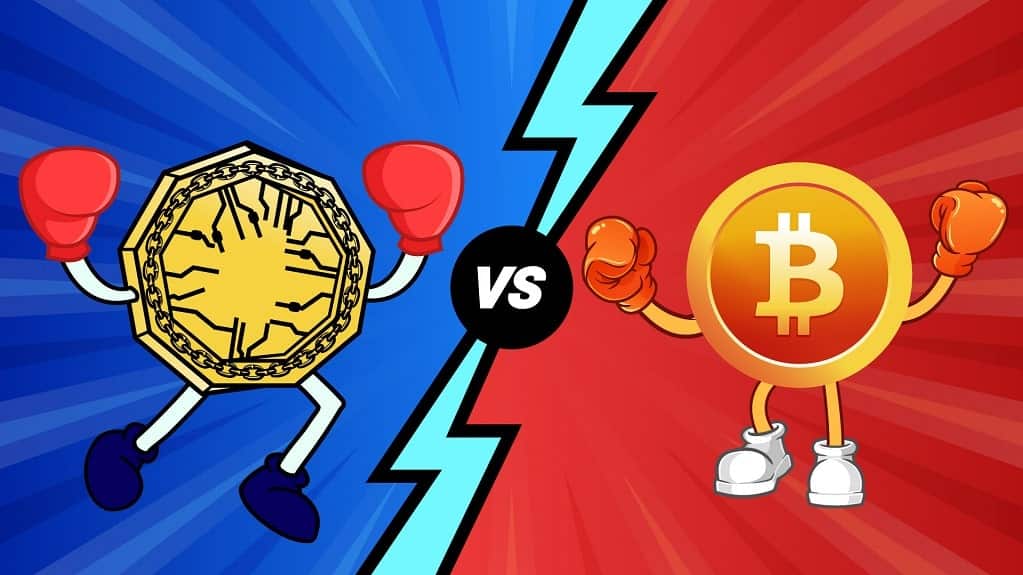
What Are the Key Differences Between Bitcoin and Blockchain?
Bitcoin and Blockchain leave many perplexed. This article aims to cast some light on the fundamental differences. Bitcoin, officially introduced in 2009, is a digital currency based on blockchain technology and follows the peer-to-peer (P2P) model. The inventor(s), pseudonymously known as Satoshi Nakamoto, developed this cryptocurrency to eliminate the need for intermediaries like centralized banks and to encourage P2P transactions.
Blockchain is a technology that stores the data of Bitcoin transactions. Simply put, it is a public ledger that stores each transaction on its block and forms a chain of blocks as multiple transactions follow. However, the data stored in each of the blocks is immutable, and it also forms a permanent record, and all these blocks together form a blockchain. This feature contributes to security, anonymity, and easy accessibility to carry out Bitcoin transactions.
Bitcoin vs. Blockchain
The value of one Bitcoin today has touched $33,076, which was reported to be $17900 in December 2017, which is highest in the past three years.
On the other hand, blockchain technology is not limited to just cryptocurrency. This technology can be adopted by businesses that need to secure smart contracts through encryption, reduce the friction through automated transactions that require minimal human intervention, and enable decentralized data management.
Even as the world stands divided on whether to embrace Bitcoin or not, the adoption of blockchain technology is welcomed by various businesses across the globe. Countries like China, Bolivia, Columbia, Russia, and Iran have banned Bitcoins as of Dec 2020. India, too, had initially banned cryptocurrency in 2018 till March 2020. But Blockchain technology hasn’t received any resistance; instead, it has already been a part of FedEx, Burger King Russia, KIK Interactive Inc., IBM, Walmart, Microsoft, and many more.
What are the Key Differences Between Blockchain & Bitcoin?
| Bitcoin | Blockchain |
| What and Why? | |
| Bitcoin is a digital currency invented to enable P2P transactions without a centralized banking system | Blockchain is a technology created to allow data encryption of the P2P transactions |
| One word | |
| Cryptocurrency | Digital-ledger |
| Scope | |
| A transaction is limited to buying, selling, and holding Bitcoins | Blockchain technology is beyond Bitcoin and can be employed in multiple business models and sectors |
| How does it work? | |
| When Bitcoin is transferred between two Bitcoin wallets (P2P transaction), it is recorded on the blockchain ledger. The wallets have private keys that are utilized to carry out the exchange through an algorithm as proof of the transaction. This private key acts as a signature and hence requires no need to disclose the name, address, and other details of the parties, allowing complete anonymity and greatest security. | The Blockchain is a digital ledger of these Bitcoin transactions. The blocks contain three basic elements- hash, data, and a hash of the previous transaction. Data represents the amount of the transaction, transaction details, etc. A hash is a function derived from an algorithm to deliver a unique identity to the contents of the block, and each block has the previous block’s hash. |
| Nature | |
| Since Bitcoin transactions are anonymous, they may lack transparency and can be targeted by hackers. | Blockchain is a technology adopted by many businesses. |
| Flexibility | |
| Only 21 million Bitcoins will ever be mined as per the design laid down by Satoshi Nakamoto. Apart from the number of Bitcoins, the overall fabric of Bitcoin has limited room for change. | Developers can use Blockchain’s software and create a customized solution |
Things you should know about Bitcoin & Blockchain
1. The Bitcoin business is volatile
Owing to its small market size, lower liquidity, regulations, and speculative environment, one should tread carefully.
2. Transactions are irreversible
Once the transaction is carried out, it can only be refunded by the other party and cannot be retracted.
3. Bitcoins are not anonymous per se
Stored transaction data stored is accessible, but transaction addresses don’t reveal your identity unless the government decides to trace it.
4. Payments methods are broadly accepted
With the mass adoption of cryptocurrency, multiple Bitcoin wallets, and Bitcoin debit cards, Bitcoins are now widely accepted as a payment option.
Final Words
Both Bitcoin and blockchain technology have set the stage to transform lives through their applicability. While the former is transforming the crypto space and investments, the latter has leaped beyond the crypto-industry. Blockchain’s applications connect distinct industries; from casino prizes to food traceability. Bitcoin was a glimpse into the future, a realization of autonomy, and privacy. Only economic events and government regulations will tell how far and how deep these technologies will penetrate our everyday lives. Apart from this, If you are interested in Bitcoin and want to make an investment in Bitcoin to make a profit from it then Bitcoin Code is a perfect platform for you. Check its official website or Bitcoin Code Review to know more about it.

